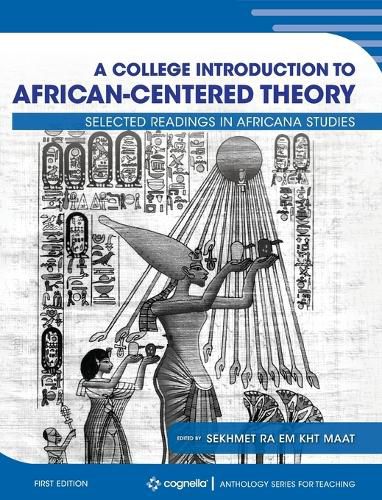Readings Newsletter
Become a Readings Member to make your shopping experience even easier.
Sign in or sign up for free!
You’re not far away from qualifying for FREE standard shipping within Australia
You’ve qualified for FREE standard shipping within Australia
The cart is loading…






This title is printed to order. This book may have been self-published. If so, we cannot guarantee the quality of the content. In the main most books will have gone through the editing process however some may not. We therefore suggest that you be aware of this before ordering this book. If in doubt check either the author or publisher’s details as we are unable to accept any returns unless they are faulty. Please contact us if you have any questions.
A College Introduction to African-centered Theory: Selected Readings in Africana Studies provides students with a compilation of scholarly works on Africana studies, African-centered theoretical models, and African-centered schools of thought.
The anthology is comprised of foundational readings used widely within Africana studies and four new writings by scholars in the discipline. Part I provides readers with an overview of the origins, demands, and challenges surrounding the struggle to bring about and sustain Africana studies in the American academy. The readings in Part II introduce students to worldview, cosmology, and epistemology as the foundational ideas for African-centered theory. Parts III, IV, and V explore three African-centered schools of thought: Association for the Study of Classical African Civilizations, African-centered Psychology, and The Temple School of Thought. The final reading shows how African-centered theory can continue to address pressing needs of Africana people in the 21st century and serve as a method for the liberation of political prisoners and other incarcerated people.
Throughout, section introductions provide a brief historical, conceptual, and biographical framework through which to view the readings. Terms, concepts, and thinkers of importance are identified to help students build an African-centered vocabulary and become familiar with meaningful contributors to the discipline. The anthology includes discussion questions to support student learning and inspire lively discussion and thoughtful reflection.
Engaging and comprehensive, A College Introduction to African-centered Theory is an excellent resource for undergraduate courses in Africana studies.
$9.00 standard shipping within Australia
FREE standard shipping within Australia for orders over $100.00
Express & International shipping calculated at checkout
This title is printed to order. This book may have been self-published. If so, we cannot guarantee the quality of the content. In the main most books will have gone through the editing process however some may not. We therefore suggest that you be aware of this before ordering this book. If in doubt check either the author or publisher’s details as we are unable to accept any returns unless they are faulty. Please contact us if you have any questions.
A College Introduction to African-centered Theory: Selected Readings in Africana Studies provides students with a compilation of scholarly works on Africana studies, African-centered theoretical models, and African-centered schools of thought.
The anthology is comprised of foundational readings used widely within Africana studies and four new writings by scholars in the discipline. Part I provides readers with an overview of the origins, demands, and challenges surrounding the struggle to bring about and sustain Africana studies in the American academy. The readings in Part II introduce students to worldview, cosmology, and epistemology as the foundational ideas for African-centered theory. Parts III, IV, and V explore three African-centered schools of thought: Association for the Study of Classical African Civilizations, African-centered Psychology, and The Temple School of Thought. The final reading shows how African-centered theory can continue to address pressing needs of Africana people in the 21st century and serve as a method for the liberation of political prisoners and other incarcerated people.
Throughout, section introductions provide a brief historical, conceptual, and biographical framework through which to view the readings. Terms, concepts, and thinkers of importance are identified to help students build an African-centered vocabulary and become familiar with meaningful contributors to the discipline. The anthology includes discussion questions to support student learning and inspire lively discussion and thoughtful reflection.
Engaging and comprehensive, A College Introduction to African-centered Theory is an excellent resource for undergraduate courses in Africana studies.